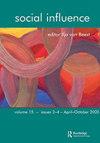Objectified conformity: working self-objectification increases conforming behavior*
IF 0.6
3区 心理学
Q3 PSYCHOLOGY, SOCIAL
引用次数: 17
Abstract
Abstract The present work explores whether self-objectification triggered by doing peculiar work activities would increase people’s conforming behavior. We conducted an experimental study in which participants (N = 140) were asked to perform a high objectifying activity (vs. low objectifying activity vs. baseline condition) simulating a real computer job. Afterwards, their levels of self-objectification and conforming behavior were assessed. Results revealed that participants who performed the high objectifying activity self-objectified (i.e., perceived themselves as lacking human mental states) more than the other conditions and, in turn, conformed more to the judgments of unknown similar others. Crucially, increased self-objectification mediated the effects of the high objectifying activity on enhancing conforming behavior. Theoretical and applied implications of these findings are discussed.客体化从众:工作中的自我客体化增加了从众行为*
摘要本研究探讨了从事特殊工作活动所引发的自我物化是否会增加人们的从众行为。我们进行了一项实验研究,要求参与者(N = 140)执行一项高客观化活动(相对于低客观化活动与基线条件),模拟真实的计算机工作。之后,对他们的自我物化水平和顺从行为进行了评估。结果显示,参与高客观化活动的参与者自我客观化(即认为自己缺乏人类的精神状态)的程度高于其他条件,反过来,他们更符合未知的相似他人的判断。重要的是,自我物化的增加介导了高物化活动对从众行为的增强作用。讨论了这些发现的理论和应用意义。
本文章由计算机程序翻译,如有差异,请以英文原文为准。
求助全文
约1分钟内获得全文
求助全文
来源期刊

Social Influence
PSYCHOLOGY, SOCIAL-
CiteScore
1.50
自引率
0.00%
发文量
4
期刊介绍:
Social Influence is a journal that provides an integrated focus for research into this important, dynamic, and multi-disciplinary field. Topics covered include: conformity, norms, social influence tactics such as norm of reciprocity, authority, scarcity, interpersonal influence, persuasion, power, advertising, mass media effects, political persuasion, propaganda, comparative influence, compliance, minority influence, influence in groups, cultic influence, social movements, social contagions, rumors, resistance to influence, influence across cultures, and the history of influence research.
 求助内容:
求助内容: 应助结果提醒方式:
应助结果提醒方式:


